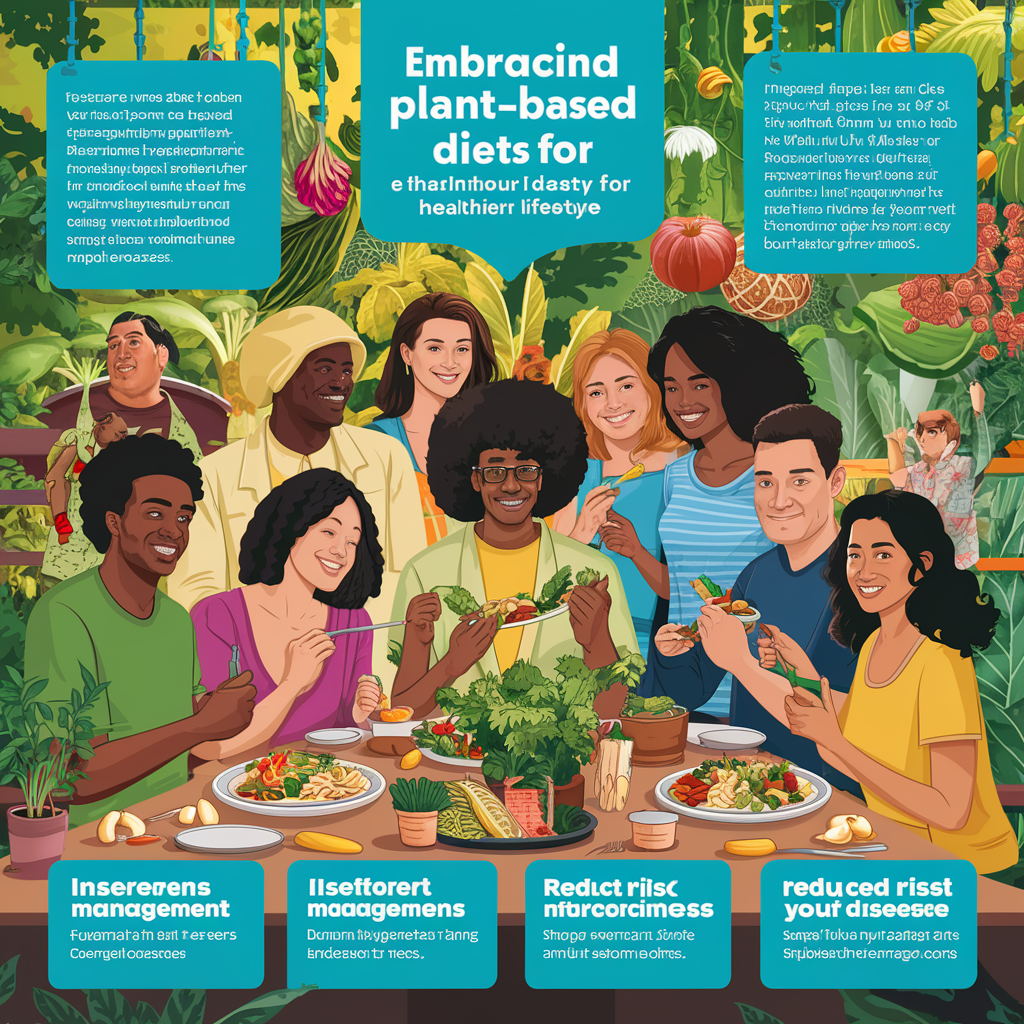Embracing Plant-Based Diets for a Healthier Lifestyle
Have you ever found yourself staring at a plate of food, pondering the life choices that led you to that moment? I remember a time when I was at a barbecue, surrounded by the aroma of grilled meats and the laughter of friends, thinking, “Is there more to life than burgers and hot dogs?” It struck me then that perhaps a shift was needed—not just in my diet, but in my entire approach to living. That’s the essence of embracing a plant-based diet.
In recent years, the concept of plant-based eating has gained considerable traction, and for good reason. It’s not just a trend; it’s a lifestyle choice that can lead to significant health benefits. From improved heart health to increased energy levels, the reasons to consider this dietary shift are compelling. So, let’s dive deeper into this journey of embracing plant-based diets and explore how they can pave the way for a healthier lifestyle.
Understanding Plant-Based Diets
At its core, a plant-based diet emphasizes foods derived from plants. This doesn’t solely mean fruits and vegetables—you’d be surprised by the variety! It encompasses nuts, seeds, oils, whole grains, legumes, and beans. Some individuals who follow a plant-based diet may still consume small amounts of animal products, but the focus remains predominantly on plants.
It’s crucial to clarify that plant-based does not automatically equate to veganism. While vegans abstain from all animal products, including dairy and eggs, a plant-based diet allows for flexibility. You might find someone who identifies as plant-based enjoying a sprinkle of feta cheese on their salad or a side of fish occasionally. The idea is to prioritize plant foods while reducing animal products for health or ethical reasons.
Health Benefits: The Proof is in the Pudding (or Salad)
Scientific research consistently supports the health benefits of plant-based diets. A significant number of studies suggest that individuals who consume more plant-based foods experience lower risks of chronic diseases. Let’s break down some of the most notable benefits, shall we?
- Heart Health: A diet rich in fruits, vegetables, and whole grains can improve heart health and reduce blood pressure. It’s like giving your heart a mini-vacation.
- Weight Management: Many plant-based foods are lower in calories and higher in nutrients, making it easier to maintain a healthy weight. (I mean, who doesn’t want to sneak in an extra slice of cake without the guilt?)
- Improved Digestion: The fiber found in plant foods is your digestive system’s best friend. Regular fiber intake can help prevent constipation and promote overall gut health.
- Diabetes Management: Some studies indicate that a plant-based diet may help improve blood sugar levels and insulin sensitivity, making it a smart choice for those managing diabetes.
- Longevity: Research suggests that individuals who follow a plant-based diet may live longer, healthier lives. It’s like investing in a long-term relationship with your health!
Those are just a few highlights, but there’s a treasure trove of research out there. For instance, the Adventist Health Study, which tracked the health of over 96,000 Seventh-day Adventists, found that vegetarians had a 12% lower risk of death from heart disease compared to non-vegetarians. Now, I’m not saying you should abandon your favorite steakhouse entirely, but the evidence certainly leans in favor of more plants on your plate.
Getting Started: Practical Steps to Transition
Now, I know what you’re thinking—“How do I even begin to make this transition without feeling like I’m losing a part of my culinary identity?” Fear not! Here are some practical steps to ease into a plant-based lifestyle:
1. Start Small
Instead of overhauling your entire diet overnight, consider starting with “Meatless Mondays.” Gradually incorporate more plant-based meals throughout the week and observe how your body reacts. It’s like dipping your toes in the water before jumping into the deep end.
2. Explore New Recipes
Rediscover the joy of cooking with vibrant plant-based recipes. From hearty lentil stews to zesty quinoa salads, the options are endless. I still chuckle at the time I tried making a vegan lasagna—let’s just say my kitchen looked like a vegetable explosion. But the end result? Delicious!
3. Experiment with Substitutes
There are countless plant-based alternatives for your favorite animal products. Craving a burger? Try a black bean or chickpea patty. Need a creamy pasta sauce? Blend cashews and nutritional yeast for a rich, cheesy flavor. You might just surprise yourself with how satisfying these alternatives can be.
4. Join the Community
Find like-minded individuals who share your interest in plant-based eating. Local groups, online forums, or social media platforms can provide inspiration, support, and a sense of camaraderie. Plus, you’ll have a ready-made crew to swap recipes and tips with—what’s better than that?
Navigating Challenges: Addressing Common Concerns
As with any lifestyle change, challenges are bound to arise. Here, I’ll address a few common concerns that might pop up on your journey to plant-based eating.
1. Nutritional Deficiencies
One of the most common worries about plant-based diets is the potential for nutritional deficiencies, particularly in protein, iron, and vitamin B12. But fear not! With a little planning and knowledge, it’s entirely possible to meet your nutritional needs.
Protein can be found in abundance in legumes, tofu, tempeh, nuts, and seeds. Iron-rich foods include lentils, chickpeas, quinoa, and fortified cereals. As for vitamin B12, it’s primarily found in animal products, but you can opt for fortified foods or take a supplement. Just like that, you’re empowered!
2. Social Situations
Let’s face it—navigating social events while following a plant-based diet can sometimes feel like walking a tightrope. You might find yourself surrounded by meat-laden dishes during a family gathering or a friend’s barbecue. (I mean, who knew the world revolved around steak?)
In these situations, communication is key. Don’t hesitate to express your dietary preferences to your friends and family ahead of time. Many people are more than willing to accommodate your choices, and you might even inspire them to try something new!
3. Cravings and Temptations
Ah, cravings—the nemesis of anyone attempting to change their eating habits. Whether it’s the allure of a gooey cheese pizza or a decadent chocolate cake, those temptations can be tough to resist. But here’s a little secret: it’s perfectly okay to indulge now and then. Moderation is the name of the game.
Moreover, try to find plant-based alternatives that satisfy those cravings. Vegan cheese, nut-based desserts, and hearty plant-based meals can often hit the spot just as well. Who knew that a chickpea cookie could be so delicious? It might just become your new guilty pleasure.
Real-Life Examples: Success Stories
Stories of individuals who have embraced plant-based diets are both inspiring and enlightening. Take John, for instance, a 45-year-old father of two who decided to transition to a plant-based lifestyle after experiencing high cholesterol levels. Within months of adopting a diet rich in fruits, vegetables, and whole grains, he not only lowered his cholesterol but also lost weight and felt more energetic than ever. “I never thought I could feel this good without bacon!” he often remarks with a chuckle.
And then there’s Sarah, a busy college student who feared that switching to a plant-based diet would make her meals bland and boring. Contrary to her initial belief, she discovered a world of flavors and textures she never knew existed. “I realized that food can be both healthy and exciting,” she says, reflecting on her journey. “Plus, I save so much money by cooking at home!”
Culinary Adventures: Making Plant-Based Eating Fun
Let’s be honest: Eating should be a delightful experience, not a chore. Embracing a plant-based diet can open the door to culinary adventures that excite your taste buds. Here are a few fun ways to make your plant-based journey enjoyable:
Culinary Exploration
Why not take a trip around the world through your kitchen? Explore cuisines that naturally emphasize plant-based ingredients, such as Indian, Thai, and Mediterranean. You might find yourself whipping up fragrant curries, zesty tabbouleh, or spicy chili. Your taste buds will thank you!
Cooking Challenges
Invite friends over for a cooking challenge where everyone prepares a plant-based dish. It’s a great way to bond while also trying new recipes. Plus, you’ll end up with a feast fit for a king (or queen) without breaking the bank.
Gardening
If you have the space, consider starting your own vegetable garden. There’s something incredibly rewarding about growing your own food. I still remember the thrill of harvesting my first tomato—it was like a little victory lap for my taste buds!
Conclusion: A Journey Worth Taking
Embracing a plant-based diet is more than just a dietary choice; it’s a journey toward a healthier lifestyle and a more sustainable planet. While it may come with its challenges, the rewards are worth the effort. From improved health to newfound culinary creativity, the benefits are abundant.
So, as you contemplate the next meal on your plate, remember that it’s not just about what you eat, but how you feel—both physically and emotionally. Whether you’re diving headfirst into plant-based eating or simply looking to incorporate more plants into your diet, every little step counts. And who knows? You might just discover a new favorite dish along the way.
Now, go forth and embrace the joys of plant-based living—your body (and taste buds) will thank you!






